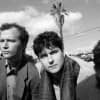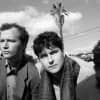On the heels of his first solo EP Sunburn, we visited Vampire Weekend bassist Chris Baio in his very pleasant backyard in Greenpoint, Brooklyn to talk about pursuing his own side projects, taking up boxing, working on the new Vampire Weekend album and the merits of music you can read to. Stream the EP and read our Q&A below.
Stream: Baio's Sunburn EP
Was branching out to do your own music something you’ve always wanted to do? For a while I was really sort of shy and scared about trying something on my own, and maybe this sounds a little weird to say, but being in a successful band made the idea of failure become really, really scary because I hadn’t experienced it. When you’re 16 and you don’t know any better and you just pick up a guitar and start writing songs, you’re not thinking about succeeding or failing because its not like on those terms but for a very long time I just thought I probably shouldn’t try to do anything on my own, but I started taking all these DJ gigs when we were touring the last Vampire Weekend record, and some of them were so terrible—like 10 people, like five people. It was sort of funny to experience—realizing that failing at something is not the worst thing in the world. You can get a kick out of it. I guess I would say experiencing failure made me way less scared about doing my own thing or sharing my own thing.
When did you decide that you were going put out a solo EP? The process of recording these songs for the EP started in February of last year until about two months ago, when the very last bit came into place which was Matias Aguayo’s vocal on the song “Tanto.” I started getting more into learning how to produce stuff about a year ago because I knew the basics of how to record music, but, you know, I play in a band with a really great producer. It’s kind of a weird feeling to travel the world and be on tour and be successful in a band and not be able to record something that doesn’t sound terrible on your own. It was something that had frustrated me for awhile, so when I knew I was going to be home [off tour], my first priority was learning how to do things like that.
How do you know Matias Aguayo? I don’t, actually. I really think now is the easiest time at any point in history to make music. The technology has been relatively democratized where it’s a six hundred dollar program, or if you know you can’t afford that, you can find a cracked version online. As someone who makes music I find that super exciting, but another real plus is that I can make a song with someone that I’ve never met or had a conversation with. When I originally sent that track to Alex Waldron [of Greco-Roman], it had a sample off an Italian folk record um from the ’60s and I liked it, but when I sent it to Alex he was like the vocal annoys me a little bit, so he gave me a list of people to contact about singing the hook, and Matias’ name was the one that jumped out because I was a huge fan of Closer Musik, which was his group on Kompakt when I was in college. I remember listening to them a lot and they were a band I feel like you could read and dance to. I love his solo record, I love Ay Ay Ay. I thought, yeah sure ask him, he’ll probably say no and when he came back and said he was willing to, I was so thrilled.
Did you share any of the material with your bandmates as you were working? No. I kind of wanted to strike out on my own in a way, and I sent it to them basically when it was done. Usually I hear [side project] stuff my bandmates do when it’s finished.
Now that you feel like you've gotten to a point where producing for yourself is coming more easily, do you have any interest in producing for other people? I would love to produce other people. I'd love to send beats out. I'd love to score more movies. When I think of where I want to be in 20 years—if I'm lucky enough to still be able to afford rent in New York without a day job by playing music—I would probably rather be producing or scoring movies than on a tour bus.
It seems like you've branched out considerably this past year. I like that mentality about music because I don't ever want to be complacent. I mean, I think there are some musicians that I love, but they'll reach a certain age and they'll sort of stop listening to new music or things that are happening. I love Bryan Ferry and I love Roxy music, but I read the book The Thrill of it All recently, but at a certain point Ferry essentially stopped listening to new music. He's someone I admire, but I would never want to be like that. I think that if you're going to be a producer and that's a role you want to pursue, it is important to always stay up on new stuff. The other thing I did last year was I scored this independent movie Somebody Up There Likes Me. That was very different music, mostly acoustic guitar stuff. It's directed by the filmmaker Bob Byington. He's based in Austin. But writing music for that, which is very simple melodic music and short pieces that are mostly like a minute to two minutes long, having that and also having these long, more rhythmic song for Sunburn was neat. Having two very different projects and having these two collaborative relationships where I felt like I could send people raw music and get honest feedback—in the case of the movie, I was sending Bob these guitar sketches.
Are you pursuing anything new production or soundtrack-wise? Not really. I'm at this point where I get up every morning, and I work on music in one form or another. Obviously, you know, we had band practice yesterday, have band practice tomorrow. I'm working in my waterless apartment today on music and coming up with ideas. What will come of them, I have no idea. It's not necessarily that realistic right now for me to take on producing another person’s album. I do feel like I have so much more to learn, but it's something that I would love to be doing down the line, absolutely. How is the working process? What do you do to stay not crazy when you're working at home alone? I realized a very important thing my sanity—this is funny, but I like to get lunch with people, because it's true, if I were left to my own devices I would stare at a computer screen for eight hours a day. And then when my girlfriend comes home, we’d hang out and I also find that I'm not the best company when I've been staring at a computer screen for eight hours a day. I recently picked up boxing. That's my new hobby. I'm not sure if that keeps me sane or not yet. I'm like two months in. But I sparred for the first time yesterday and that was exciting.
How did it go? My boxing teacher was very—obviously he could destroy me, so he did not punch me very much at all. It felt—I mean I've never gotten in a fight in my entire life. I'm a very, very mellow, accommodating person. I can't even remember the last time I raised my voice. I like learning how to box because in a way it seems like putting myself in this uncomfortable place and I think that's also part of not being complacent, like playing a song that might clear a dance floor. That’s like as similar mentality in a way. I've never thrown a punch at someone, I've never taken a punch, but getting knocked around a little bit, it was life affirming.
What is your timeline like, then, for touring Sunburn, your solo work and next Vampire Weekend record? The reality is [Vampire Weekend] is always going to be my priority. The fact that I was able to put this EP out is because I had time on my hands to do it. It's important to me to be a daily musician and to work on stuff. The album's been in progress now and it’s just sort of like other stuff that I would put out on my own really depends on the pacing of the band. I have a bunch of things of my own that are also in progress but obviously the band takes first priority.
What was the vibe you were interested in capturing on Sunburn? I was thinking about making songs that you could dance to and read to. Anytime I am sitting down to work on a track, I always find boiling down specific influences can be a difficult thing because when you’re working on music, I think obviously your sensibilities are informed by what you like and what you’ve listened to, but if you’re working on a sound or something from a production sense, it can be something that was planted in your head from a record you heard when you were eight years old, and I tend not to be as overt, saying I want to make a song that sounds like something, that has a drum beat that could work from like a Can song from like the ’70s. It’s more letting the process lead me with that simple goal of making music that you could read to and you could dance to.
Do you feel like you could dance or read to Vampire Weekend? I think people could. Personally, I always have a difficult time reading with music with vocals on unless it’s in a foreign language, like listening to a Brazilian record I like that you’re really just thinking about melody and rhythm and in a way the voice really does become another instrument. My philosophy is that a great melody can forgive any lyric. I truly feel that way, and I remember watching this interview with Iggy Pop and he used the word “banal,” which I didn’t know how to pronounced before—this was maybe when I was like 19 years old like and I’d read it when I was taking my SATs or whatever and pronounced it in my head as “baynal,” which is also hilarious—but he said something like the greatest pop songs in the world have incredibly banal lyrics, and I think that’s true. Our band does its best in English language countries so obviously the lyricism is important, and like even my bandmates’ music before, you know the stuff that they did before Vampire Weekend, it’s clear that there’s incredible lyrical talent. That’s something that I definitely recognized, but as far as my musical enjoyment, I love foreign music.
Maybe that’s what you mean by being able to read or something but do you feel like when you were making this, is there any sort of emotional or like aspect to the music? I mean I think that there’s a melancholy to all three songs and I think a lot of the melodies are more minor-sounding. The term I had was hopeful melancholy.
What is hopeful melancholy? I think those two ideas are a little bit opposing in the way that reading and dancing are. Sometimes I mean it can be as simple as a turn of phrase. I think you can be optimistic about your future, but no matter what, time is still going by. There’s something both hopeful about the fact that you’re alive today and you will hopefully be alive tomorrow but also the melancholy is the idea of the things that are behind you are behind you.


